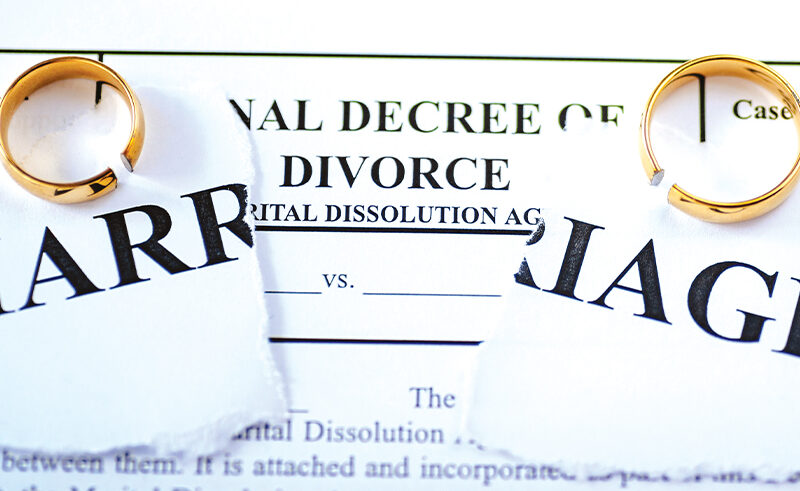Breaking up is hard to do. But an expat divorce abroad adds a whole other level of complexity. As a first step it’s important to find a good divorce lawyer so you know how to apply for divorce in Singapore. Here, legal experts walk us through the divorce process for expats in Singapore including the new divorce by mutual agreement that just came into force in July 2024.
How to apply for divorce in Singapore with a divorce lawyer
Here are some issues to take into account when considering how to apply for divorce in Singapore.
New development: divorce by mutual agreement
JEREMY CHEONG is a divorce lawyer and partner at JCP Law LLC, a law firm in Singapore advising clients on a broad range of matters including litigation, international arbitration, corporate and commercial advisory, criminal defence, family and matrimonial law, probate and letters of administration, torts, and employment.
There is only one reason for divorce to be granted in Singapore, which is the “irretrievable breakdown” of the marriage. To prove that there is an irretrievable breakdown of the marriage, there used to be five grounds, namely adultery, unreasonable behaviour, desertion, separation of three years with consent, or separation of four years without consent.
“With the introduction of divorce by mutual agreement, couples now have a completely neutral scenario that can be cited in divorce proceedings,” explains Jeremy. This new option, which increases the number of grounds from five to six, allows couples to divorce without needing to prove fault or meet the lengthy separation requirements.
“It aims to reduce acrimony in divorce and better allow the family to heal and move on, especially when children are involved,” says Jeremy. Previously, even if parties had agreed to an uncontested divorce, there could be disagreement on the reason for the breakdown of the marriage, which might cause a dispute. “Likewise, if separation was used as grounds, both parties would be required to put their lives on hold for either three or four years to meet the timeline requirements.”
With divorce by mutual agreement, parties must agree that their marriage has broken down irretrievably and provide an explanation for their conclusion. “They must also detail reconciliation attempts and considerations for their financial affairs and children (where applicable) after the divorce,” says Jeremy. This new option marks a significant development in Singapore’s family law landscape, offering a more amicable route for couples seeking to end their marriage.
JCP Law LLC
6 Battery Road, #11-01A
6206 5200 | jcplaw.com.sg
The requirements for divorce by mutual agreement
MICHELLE WOODWORTH has over 26 years of experience as a family litigation and divorce lawyer, including serving as a Family Court District Judge, mediation advocate and Principal Mediator with the Singapore Mediation Centre and Senior Mediator with the Law Society of Singapore.
“A sixth fact to support the irretrievable breakdown of a marriage has been introduced to the Women’s Charter allowing a husband and wife to agree to dissolve their marriage if certain criteria are met,” says Michelle.
The Court will only grant a divorce if satisfied that is just and reasonable to do so taking into account all relevant circumstances, including the conduct of the parties and how a divorce would affect them and any child of the marriage. “It won’t accept the agreement to divorce if it considers there remains a reasonable possibility for reconciliation between the husband and wife.”
To qualify, the couple must sign a written form including the following:
- Reasons for the breakdown of the marriage – a bare agreement without explanation is not enough.
- Efforts to reconcile – details of efforts made such as the number of attempts, nature of efforts and whether and what external help was sought.
- Why further efforts to reconcile will not lead to a reasonable possibility of reconciliation – details of other options that remain unexplored and why, considering the efforts made, parties believe that further attempts are unlikely to succeed.
- Consideration to arrangements for financial affairs including any agreements reached on custody, care and control of the children of the marriage, division of assets, spousal and child maintenance.
“Hopefully, where parties decide to uncouple with consciousness and agreement, they’ll have a better foundation to work on and resolve their ancillary matters, such as children’s issues and financial matters.”
Quahe Woo & Palmer LLC
#02-02 Haw Par Centre, 180 Clemenceau Avenue
6622 0366 | qwp.sg
Division of matrimonial assets
VIVIENE SANDHU is an experienced family law advocate with over 26 years of experience. She is a Co-Managing Partner at Clifford Law LLP, a full-service law firm in Singapore that specialises in family law, employment law and negligence (professional and personal injuries) matters since 2005.
A common misconception about divorce in Singapore is that spousal gifts such as jewellery or personal property are automatically excluded from the division of matrimonial assets. Viviene clarifies that, “many believe gifts given by one spouse to the other remain personal property in the event of a divorce, but this isn’t always the case. Under the Women’s Charter, gifts can be classified as matrimonial assets if they have been substantially improved or used for the family’s benefit.”
For instance, a gifted property that was jointly renovated or income-generating assets that contributed to family finances may be included in the division. This means that even assets originally intended as personal gifts may become part of the pool of matrimonial assets if they are considered to have benefited both parties.
The law aims for an equitable division of assets, taking into account contributions from both parties, whether financial or non-financial, such as raising children or managing the household. Viviene emphasises the importance of understanding these nuances when navigating divorce. “Matrimonial asset division is rarely straightforward and ensuring that gifts and other personal assets are properly assessed requires careful consideration of each party’s contributions,” she says.
Navigating the complexities of asset division can be challenging, but Viviene’s extensive experience equips her to guide clients through this sensitive process. Her expertise ensures that clients understand their rights and options and facilitates parties to achieve a fair and just resolution.
Clifford Law LLP
#08-04 The Adelphi, 1 Coleman Street
6223 4456 | cliffordlaw.sg
How to apply for divorce in Singapore as an Aussie expat
FIONA HOAD is an Australian qualified lawyer and partner at Bartier Perry in Sydney, with 26 years of experience in all aspects of family law. She is an accredited specialist in family law and her experience includes property settlements for separated, married and de facto couples, spouse and child maintenance, financial agreements and postseparation parenting matters. Fiona has also acted for many international clients where jurisdiction is an issue or where assets are located across multiple jurisdictions and there are issues involving postseparation international relocation of children.
Relationship breakdown can be made even more stressful when it occurs outside of Australia and in an unfamiliar legal system. According to Fiona, Singapore and Australia deal with asset separation, spouse maintenance and child maintenance differently. “Many expats are not aware that they should obtain family law advice from a local Singapore family lawyer and an Australian family lawyer to determine the best forum to resolve their financial relationship with their spouse,” she says.
Where expats have assets in Australia and overseas, it may be more advantageous to have their financial relationship determined under Australian family law instead of Singaporean family law. “Australian courts can make family law orders in relation to assets located outside of Australia. But property settlement orders obtained in Singapore are not recognised in Australia. It’s not possible to register the orders in Australia and enforce them,” advises Fiona. If one or both of the parties intend to return to Australia after the separation, it’s important that their property settlement is enforceable there in relation to their Australian assets.
When the relationship breaks down, it’s also important for expats to review their will and estate-planning documents so that they reflect their changed personal and family circumstances.
Bartier Perry
Level 25, 161 Castlereagh Street, Sydney, NSW, Australia
fhoad@bartier.com.au | +61 2 8281 7872
bartier.com.au
Cross-border child custody and access
YUE-EN CHONG, Managing Director of Bethel Chambers LLC, is a family and divorce lawyer with over 10 years’ experience. He specialises in mediation, parenting coordination, collaborative family practice, resolving cross-border custody disputes, and also holds a masters of counselling.
“Divorce is challenging, especially when you and your ex can’t agree on child custody arrangements, whether in Singapore or elsewhere,” says Yue-En. Sometimes there’s the heartbreak of not being able to see your child because your visitation orders are not being respected by your former spouse. Even worse is the fear of your former spouse taking your child to another country without your consent.
“For expat families in Singapore, custody and cross-border custody disputes can become long, painful, and emotionally draining.” Yue-En refers to a recent high-profile case of a British mother and her Singaporean ex-husband, who fought for custody of their eight-year-old autistic son. After returning to the UK post-divorce, the mother sought full care and control, only to be denied by Singapore’s courts.
The court ruled in favour of keeping the child in Singapore, where he was thriving in a specialised autism programme. The four-year battle disrupted the boy’s care and left both parents emotionally and financially strained.
“The child’s best interests are always paramount. Yet, cross-border custody disputes often complicate this, especially when immigration laws and different legal systems come into play,” says Yue-En. He continues that for expat families, securing visitation and care arrangements while navigating these complexities can feel overwhelming. Guardianship may also become relevant, particularly if one parent is unable to care for a special needs child. “And, if a child is taken to another country without consent, the Hague Conventionmight be needed to bring them back safely.”
Bethel Chambers LLC
39B Neil Road, Level 3
6980 0230 | bethelchambers.com
Considering jurisdictions for divorce
SARAH MAE-THOMAS, Managing Director of family law firm Sarah-Mae Thomas LLC, is dually qualified in Victoria Australia and Singapore. She has a breadth of experience in managing affairs ranging from wills, probate, estate planning, guardianship, custody and divorce for the international family.
“The trendy term ‘jurisdiction-shopping’ is often misunderstood,” Sarah-Mae explains. “It’s important not to get swayed by perceived quick wins a particular jurisdiction may offer,” she cautions. “Instead, expatriate couples should consider factors like their long-term plans, children’s education plans and where they have a better support system.” In addition, certain jurisdictions impose residency requirements on their citizens before they can divorce. So expatriates who are long-term residents in Singapore might find themselves ineligible after all, Sarah-Mae points out.
The first consideration when choosing a jurisdiction is feasibility. “It should be convenient to meet lawyers, sign documents and make physical appearances in court.” If the couple chooses to remain in Singapore for their career and the children’s education, then Singapore would be the sensible jurisdiction.
“However, in instances where the family intends to return to their home country after divorce, the home country could be the sensible jurisdiction,” says Sarah-Mae. Agreeing on the children’s education plan can save a divorcing couple financial and emotional stress.
“When divorcing expatriate couples disagree on their children’s residency, Singapore Courts prioritise the children’s welfare, not where the caregiving parent has a higher earning capacity.” According to Sarah-Mae, the Court awards jurisdiction based on an aggregate of factors, such as a bigger support group of grandparents and relatives, or where the children have a better community of school and leisure activities, and even the children’s own ideas and preferences. Children who are minimally nine years old, can sometimes be interviewed by Singapore judges.
If relocation is part of the plan, Sarah-Mae also advises to appoint lawyers in your current and destination country to facilitate a smooth return.
Sarah-Mae Thomas LLC
#04-01, Park Regis Office Tower, 21 Merchant Road
9657 0693| sarahmaethomasllc.com
Child custody, care and control
Derrick Soh Law Corporation was founded in 2021. It offers practical legal guidance on family law, personal injury claims, probate and other legal disputes. SAMANTHA SOH, divorce lawyer and counsel at the firm, is well-versed in the practice of family law. She has represented clients in a wide variety of divorce cases including but not limited to child-related and relocation applications.
According to Samantha, joint custody is generally the norm unless you can show that a parent has neglected or abused the child. “Joint custody requires parents to make joint decisions on three major aspects of the child’s life – education, religion and healthcare,” she says.
“A care-and-control order is granted to the parent who is the primary caregiver of a child. That parent will make the day-to-day decisions on behalf of the child.” For instance, that parent takes care of the child’s daily necessities like food, transport and bedtime.
The parent without care and control will have visitation rights to the child. “The amount and type of visitation varies – from a “reasonable” amount to there being only limited, supervised visitation,” says Samantha. Visitation, also known as access, can take place on weekdays, weekends and/or during school holidays. “What will be ordered depends on the child’s schedule and how access will best fit in. If in doubt, you should consult your lawyer on whether specific access timings are appropriate.”
Parents are free to agree on access timings for their children. “If they cannot agree, the Court decides for them on the basis of which schedule would be in the child’s best interests.”
Derrick Soh Law Corporation
77 High Street, #08-03, High Street Plaza
9810 2551| office@
derricksohlawcorp.com
Found this article on how to apply for divorce in Singapore useful? Once you have a divorce lawyer and things are on track, maybe it’s time to focus on you. Check out some stories in our Wellness section.
This article first appeared in the December 2024 edition of Expat Living. You can purchase the latest issue or subscribe so you never miss a copy!
Finally, to make the most of living in Singapore, read our latest City Guide here for free!
Don't miss out on the latest events, news and
competitions by signing up to our newsletter!
By signing up, you'll receive our weekly newsletter and offers which you can update or unsubscribe to anytime.








